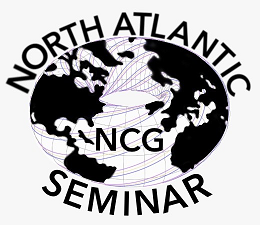
Link do kanału youtube: https://www.youtube.com/channel/UCnHfrrAKk9Jaaw8oC2s_dSQ
Zoom platform link: https://uw-edu-pl.zoom.us/j/95105055663?pwd=TTIvVkxmMndhaHpqMFUrdm8xbzlHdz09
Meeting ID: 951 0505 5663 Passcode: 924338
Organizers
- Paul Baum
- Francesco D'Andrea
- Ludwik Dąbrowski
- Søren Eilers
- Piotr Hajac
- Frédéric Latrémolière
- dr hab. Tomasz Maszczyk
- Ryszard Nest
- Marc Rieffel
- Andrzej Sitarz
- Wojciech Szymański
- Adam Wegert
List of talks
-
June 12, 2024, 5:15 p.m.
VALERIO PROIETTI (Universitetet i Oslo, Norway)
GROUPOIDS WITH TORSION-FREE ISOTROPY AND THEIR INVARIANTS
I will introduce groupoids with torsion-free isotropy and several (topological) dynamical systems of interest which give rise to groupoids in this class. We will apply methods from homotopy theory to study the K-theory of the …
-
June 5, 2024, 5:15 p.m.
PAULA S. E. MOREIRA (Universidade Federal de Santa Catarina, Florianópolis, Brazil)
THE IDEAL STRUCTURE OF PARTIAL SKEW GROUPOID RINGS WITH APPLICATIONS TO TOPOLOGICAL DYNAMICS AND ULTRAGRAPH ALGEBRAS
Given a partial action α of a groupoid G on a ring R, we study the associated partial skew groupoid ring with its natural G-grading. In this talk, we will characterize primeness, simplicity, and the …
-
May 29, 2024, 5:15 p.m.
GENNADI KASPAROV (Vanderbilt University, Nashville, USA)
ORBITAL AND TRANSVERSE INDEX THEORY FOR A PROPER LIE-GROUP ACTION
For the index theory of elliptic operators on a compact manifold X, the standard choice of a symbol algebra for (scalar) operators of negative order is C0(TX). The zero-order symbols are bounded multipliers of this …
-
May 22, 2024, 5:15 p.m.
ARKADIUSZ BOCHNIAK (Max Planck Institut für Quantenoptik, Garching, Germany)
FROM THE MYCIELSKI CONSTRUCTION TO QUANTUM TWINS
Graph theory is not only of great importance in mathematics, but also has an enormous number of applications in other branches of science. In particular, it is a key ingredient in modeling noisy communication channels. …
-
May 15, 2024, 5:15 p.m.
ALISTAIR MILLER (Syddansk Universitet, Odense, Denmark)
CORRESPONDENCES, HOMOLOGY AND K-THEORY FOR ÉTALE GROUPOIDS
One approach to understanding the K-theory of an étale groupoid C*-algebra is to approximate it with the groupoid homology. I will describe the functoriality of the K-theory, the homology and the approximation with respect to …
-
May 8, 2024, 5:15 p.m.
STEFAN WAGNER (Blekinge Tekniska Högskola, Karlskrona, Sweden)
FACTOR SYSTEMS AS A COMPUTATIONAL FRAMEWORK FOR NONCOMMUTATIVE PRINCIPAL BUNDLES
Free actions in the sense of Ellwood provide a natural framework for C*-algebraic noncommutative principal bundles, which are becoming increasingly prevalent in various applications to noncommutative geometry and mathematical physics. One of the key features …
-
April 24, 2024, 5:15 p.m.
LUCAS HALL (University of Haifa, Israel)
TOPOLOGICAL CLASSIFICATION OF SKEW PRODUCTS FOR QUIVER C*-ALGEBRAS
I will present a topological version of the combinatorial skew product for graphs, show how this designs a natural coaction on the C*-algebra associated to a topological quiver, and show natural criteria for identifying an …
-
April 17, 2024, 5:15 p.m.
TOMASZ BRZEZIŃSKI (Prifysgol Abertawe, Cymru)
HOPF HEAPS AND HOPF ALGEBRAS OF TRANSLATIONS
Grunspan and Schauenburg have proven that quantum torsors (introduced by the former) are closely connected with Hopf-Galois objects. In this talk, I will present, in part, the dualisation of this connection and, in part, a …
-
April 10, 2024, 5:15 p.m.
CATERINA CONSANI (Johns Hopkins University, Baltimore, USA)
PRIMES, KNOTS AND THE SCALING SITE
The scaling site and its periodic orbits of length log p provide a geometric construction where one can interpret the well-known analogy between primes and knots. The role of the maximal abelian cover of the …
-
April 3, 2024, 5:15 p.m.
RAIMAR WULKENHAAR (Universität Münster, Germany)
QUANTUM FIELDS ON NONCOMMUTATIVE GEOMETRIES
Quantum field theories (QFT) in four dimensions tend to be trivial or difficult, and often both. QFT on noncommutative geometries provide new examples to explore. They are not admissible examples in the strict sense of …
-
March 27, 2024, 5:15 p.m.
BORIS L. TSYGAN (Northwestern University, Evanston, USA)
NONLINEAR HOCHSCHILD AND CYCLIC HOMOLOGY
Based on the idea from the eighties due to Loday, Ogle and myself, I introduce a new version of Hochschild and cyclic homology that seems to be closely related to algebraic K-theory. Potential applications include …
-
March 20, 2024, 5:15 p.m.
EUSEBIO GARDELLA (Chalmers Tekniska Högskola, Göteborg, Sweden)
CLASSIFIABILITY OF CROSSED PRODUCTS
To every action of a discrete group on a compact Hausdorff space one can canonically associate a C*-algebra, called the crossed product. The crossed-product construction is extremely popular, and there are numerous results in the …
-
March 13, 2024, 5:15 p.m.
PAOLO ASCHIERI (Università del Piemonte Orientale, Alessandria, Italy)
NONCOMMUTATIVE PRINCIPAL BUNDLES OVER PROJECTIVE BASES AND THEIR DIFFERENTIAL CALCULI
We present a sheaf approach to noncommutative principal bundles, and extend it to differential calculi. This allows us to study the differential geometry of noncommutative bundles over noncommutative projective varieties. The main class of examples …
-
March 6, 2024, 5:15 p.m.
RUDRADIP BISWAS (University of Warwick, England)
SOME HOPF-ALGEBRA INVARIANTS AND NEW RESULTS ON THEIR RELATIONS WITH EACH OTHER
In 1987, two very interesting invariants, called silp (supremum over the injective dimension of projectives) and spli (supremum over the projective dimension of injectives) were introduced for general rings by Gedrich and Gruenberg, and a …
-
Feb. 28, 2024, 5:15 p.m.
ANDREW MCKEE (Uniwersytet w Białymstoku, Poland)
BANACH ALGEBRAS CONSTRUCTED FROM GROUPOIDS
I will explain recent joint work with K. Bardadyn and B. Kwaśniewski associating Banach algebras to (twisted) groupoids. After showing the construction, I will try to demonstrate that these objects are interesting by answering several questions. Firstly, what is …
 You are not logged in |
You are not logged in |



















